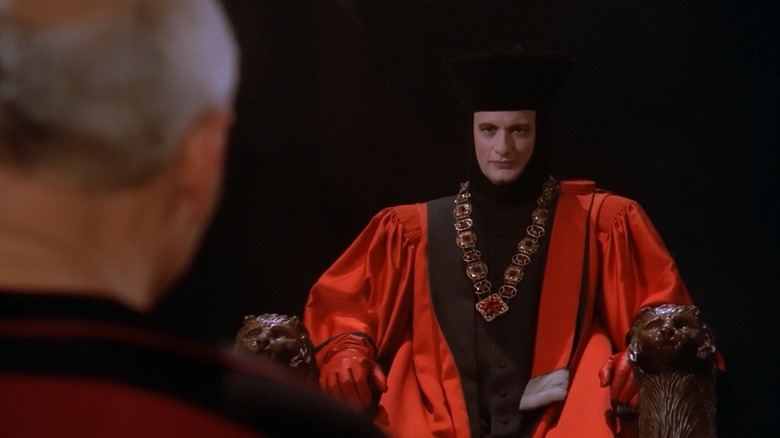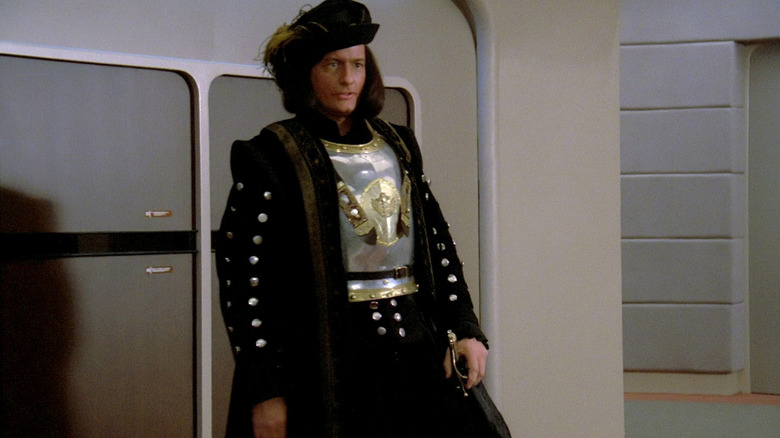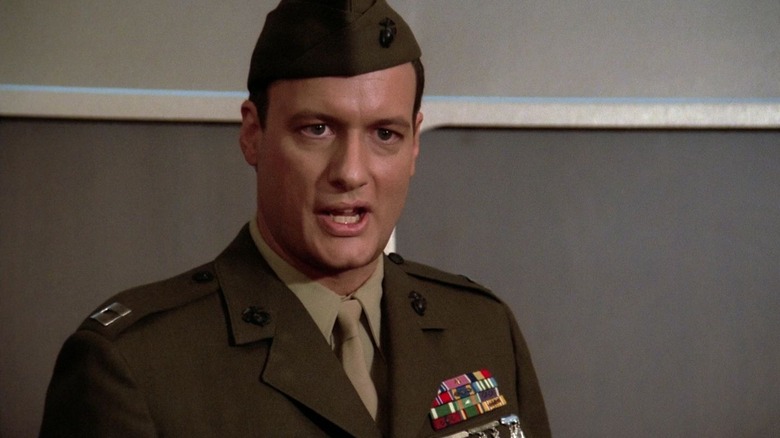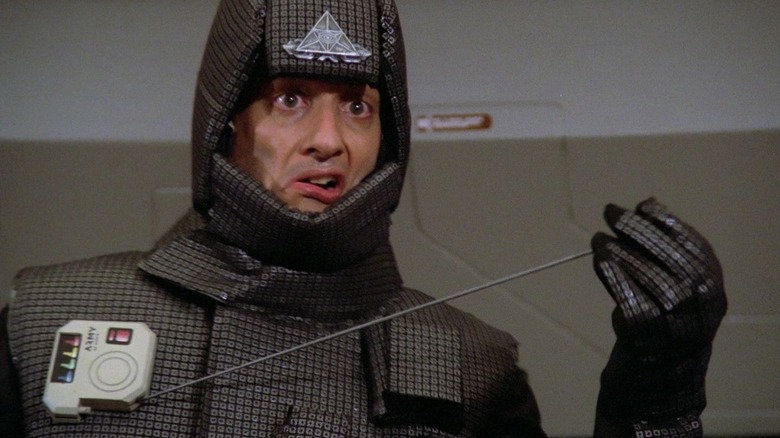Q's Introduction In Star Trek: The Next Generation Had A More Nefarious Purpose Behind The Scenes
"Star Trek" creator Gene Roddenberry is often admired for envisioning a hopeful future for humanity, but when it came to asserting control over his projects, he tended to greedily hoard as much as he could. Infamously, Roddenberry wrote lyrics — bad ones — for the original "Star Trek" theme song, merely so he could be considered a co-author. That way, he would be allowed to collect royalties on the music composed by Alexander Courage.
In the mid-1980s, Roddenberry was smarting. 1979's "Star Trek: The Motion Picture" wasn't the massive hit or critical darling that Paramount had hoped, and Roddenberry was unofficially barred from participating in any further "Star Trek" feature films. That "Star Trek II: The Wrath of Khan," "Star Trek III: The Search for Spock," and "Star Trek IV: The Voyage Home" were all bigger hits likely dealt a massive blow to Roddenberry's already-fragile ego. Hence, while developing "Star Trek: The Next Generation" in 1986, Roddenberry notoriously became a complete tartar, often trying to take control of the project away from anyone who might have any kind of agency.
Those familiar with the origins of "Next Generation" have also likely heard the name Leonard Maizlish, Roddenberry's personal lawyer, bandied about. Maizlish was known to sneak into offices and re-write scripts that had already been approved. To what end, no one entirely knows. Either Roddenberry was sending Maizlish on devious reconnaissance missions, or Maizlish was trying to take control of "Star Trek" for his own notorious reasons.
In the book "The Fifty-Year Mission: The Next 25 Years: From The Next Generation to J. J. Abrams," edited by Mark A. Altman and Edward Gross, several writers and producers reveal that Roddenberry may have invented the godlike character Q as a way to stiff writer D.C. Fontana out of a bonus.
60, 90, 120
Fontana was a "Star Trek" writer going back to the original series, having written ten episodes and served as a story consultant throughout. She would reprise these roles during the first year of "Next Generation," and was asked to write the show's pilot episode, "Encounter at Farpoint."
The episode that finally aired involved the crew of the U.S.S. Enterprise-D traveling to the remote Farpoint Station where they discover a mystery; how do the citizens seem to be able to manifest anything the visiting Starfleet officers think? The Enterprise is also visited by an all-powerful shape-shifting trickster god named Q (John De Lancie), who declares that humanity is not worthy of space travel and should be put on trial for its historic crimes instead. Captain Picard (Patrick Stewart) declares to Q that humanity is more than ready and no longer needs gods to oversee them.
Q, as it turns out, wasn't in Fontana's original script. Indeed, when she was in the middle of writing it, either Roddenberry or producer Robert H. Justman kept instructing her to either lengthen it or shorten it. There was constant vacillation as to whether "Encounter at Farpoint" would be 60 minutes, 90 minutes, or a full 120 minutes. Fontana recalled:
"As I began writing the script, and throughout the writing of the first draft, the length of the script kept bobbing up and down from two hours to an hour and a half to one hour and back up again. I was told that this was due to the fact that the decision had not been made as to whether the premiere would have a 'history of Star Trek' section, a behind-the-scenes section, or an extended preview section in addition to the dramatic story. Or whether it would be all story."
All story
Eventually, 90 minutes was the sweet spot. The final cut of "Encounter at Farpoint," by the way, was actually two hours. Fontana said:
"Every few days I was approached by Leonard Maizlish, who had begun to come to the studio daily, as to whether I thought the script could be an hour and a half, an hour, or back up to two hours. I was finally told by both Roddenberry and Maizlish to simply concentrate on my ninety minutes."
Why concentrate on 90 minutes? Roddenberry had a plan ... and not a very kind one. Producer David Gerrold recalled that Fontana, according to her contract, would be granted a bonus if she was to write a two-hour episode. Which makes sense; it's twice the length of the average episode. Anything less than two hours, and Fontana wouldn't get the bonus. Roddenberry then declared that he would write the additional 30 minutes himself, adding "bookend" material to Fontana's story. "Don't worry about expanding your story. I'll put a frame on it, Dorothy," Gerrold recalls Roddenberry saying.
That bookend material? The Q stuff. Fontana recalls the term Roddenberry used. "Although I was ready and willing to expand my story to encompass the additional half-hour," she said "I was told that Roddenberry would write what came to be called 'the prequel.'" Gerrold recalled that no one liked Roddenberry's Q idea, as Q strongly resembled the trickster god Trelane from "The Squire of Gothos" (January 12, 1967).
"We're all looking at each other, saying, 'It's Trelane all over again.' We all hated it, and very gently suggested to Gene that it wasn't very good. Of course, this fell on deaf ears. He said, 'Trust me, the way I'll do it, the fans will love it.'"
Bigger title, smaller pay
Roddenberry was eventually proved right in that regard; fans did love Q. The character's resemblance to Trelane didn't invoke ire, but eager canonical speculation. Were Q and Trelane the same species? There was even eventually a tie-in "Star Trek" novel called "Q-Squared" by Peter David that posited that very thing.
This didn't make Fontana feel any better, and Gerrold recalled a conversation with the writer over how Roddenberry too often bled writers for his own personal gain. Gerrold related the following anecdote:
"When Gene said he would put the frame on it, Dorothy said, 'There goes my bonus.' Gene said, 'Don't worry, we'll take care of you.' As we're walking out of the meeting, Dorothy says, 'I forgot. Working for Gene Roddenberry always costs me money. I remember something that I had been blocking out of my mind ...' Way back on the animated Star Trek, Dorothy had been paid X amount of money for the show."
Uh oh.
"Gene came to her and said, 'Will you take a cut in salary and the title Associate Producer?' In other words, 'We'll give you a higher title, but will you take a cut in salary, because we have to keep the show on budget?' She said yes, and later on she found out that her cut in salary coincided with Gene's raise in pay."
Roddenberry kept telling Fontana that she would be hired as a staff writer for "Next Generation," but that he was having trouble hiring her because of sexism from the Paramount bigwigs. Fontana revealed that her agent never contacted her about the possibility of a staff job.
Q was invented, Fontana didn't get a bonus, and Roddenberry was paid. It was a cosmic injustice.



